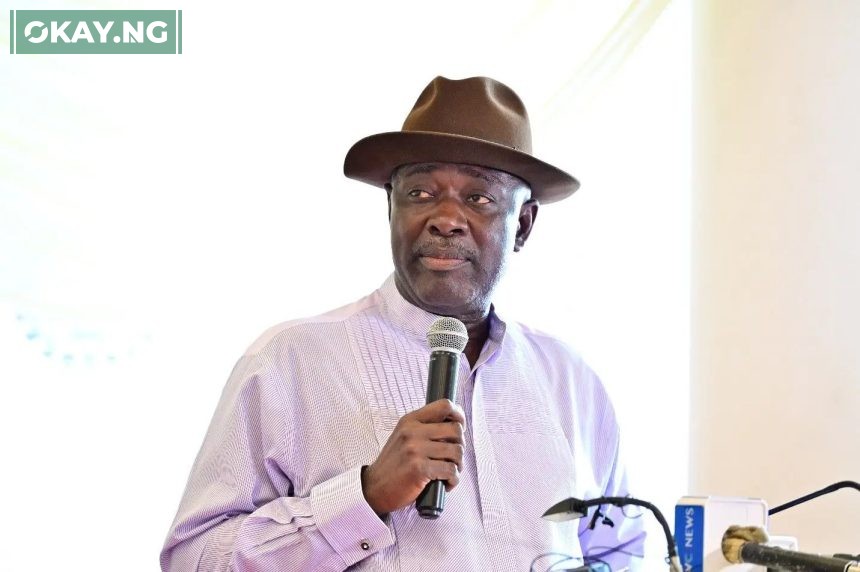In a decisive move aimed at bolstering Nigeria’s domestic manufacturing capacity and revitalizing its oil and gas sector, the Federal Government has announced an immediate ban on the importation of oil pipelines. The announcement, made by the Minister of Petroleum Resources (Oil), Heineken Lokpobiri, during the commissioning of Monarch Alloys’ new 33LPE and concrete weight coating facility in Ikorodu, Lagos State, signals a strong commitment to prioritizing local producers and fostering in-country value retention.
Minister Lokpobiri minced no words in his address, directly instructing the Nigerian Content Development and Monitoring Board (NCDMB) to cease granting waivers for the importation of pipelines, particularly those from China. “Let me take this opportunity to say today that under the leadership of President Bola Tinubu, dumping will be no more,” declared Lokpobiri, emphasizing the government’s duty to support indigenous industries. “We have a duty to support our industries to grow and render the services that are relevant to the survival and sustainability of the oil and gas industry.”
The minister underscored the critical role of pipelines in the oil and gas industry, highlighting that the very purpose of establishing the NCDMB 15 years ago was to empower Nigerian companies to build the necessary capacity to service this vital sector. He expressed his satisfaction with the progress made by companies like Monarch Alloys, while also voicing concerns about their long-term sustainability in the face of past import practices.
“In the past, Nigeria used to be a dumping ground for companies importing these pipes from China,” Lokpobiri stated, recalling the struggles faced by local manufacturers due to the influx of cheaper imports. He passionately urged the NCDMB team, present at the event, to enforce the local content act rigorously. “The pipes the industry needs are right here in Monarch Alloys Limited… instead of implementing a local content act, what is being done is that waivers are being given for Chinese products to be brought in, thereby killing companies like this one.”
Looking ahead, Lokpobiri expressed his ambition to see Monarch Alloys expand its capabilities to serve not only Nigeria but the entire African continent, emphasizing Nigeria’s leadership role in the regional oil and gas landscape. He also addressed the critical issue of Nigeria’s aging pipeline infrastructure, some of which he noted are “60 years or more,” contributing to the current limitations in the country’s oil production capacity, which he believes could easily reach 3 million barrels per day with updated infrastructure. This presents a significant opportunity for investment in the midstream and downstream sectors, further benefiting local industries.
Read Also: Nigeria’s Oil and Gas Fabrication Surpasses Domestic Needs, Eyes Export Markets
The government’s commitment extends beyond mere pronouncements, with Lokpobiri assuring continued support for companies like Monarch Alloys. “Any pipe we import from any country, we are creating and sustaining jobs elsewhere. Any pipe we buy from this company and other companies like this, we are retaining jobs in Nigeria, and we are retaining value in Nigeria,” he asserted, making it clear that he would challenge any move by the NCDMB to favor imports over local production.
Echoing the minister’s sentiments, the Chief Executive Officer of Monarch Alloys, Atul Chaudhary, proudly announced that the company is effectively ending steel importation for their needs in Nigeria. He highlighted the company’s significant growth, transforming from an importer to a leading local steel producer. “Before the time we set up in the country, we used to import steel… But today, because of local production, we don’t need to import anything,” Chaudhary affirmed, noting the rapid establishment of their state-of-the-art facility in under two years. The company boasts an impressive annual production capacity of 2 million square meters and can process up to 500 pipes daily, signaling its readiness to meet the demands of the Nigerian oil and gas sector.
The Executive Secretary of the NCDMB, Felix Ogbe, lauded the new facility as a significant stride in Nigeria’s journey towards self-sufficiency in advanced pipeline infrastructure. “This facility represents another step forward in the country’s ability to provide advanced pipeline infrastructure which is designed, built, and completed here in Nigeria,” Ogbe stated, emphasizing the alignment of private enterprise with national objectives. He further added, “At the Nigerian Content Development and Monitoring Board, we are particularly proud of this development because it speaks directly to the mandate of the Board. It strengthens our value chain, deepens local participation, and affirms our collective commitment to building an oil and gas industry driven by Nigerians.”
This bold move by the Federal Government, coupled with the demonstrated capacity of local manufacturers like Monarch Alloys, signals a promising new era for Nigeria’s oil and gas industry, one where local content and in-country value creation take center stage. The coming year will be crucial in observing the tangible impact of this policy shift on the growth and sustainability of Nigeria’s indigenous pipeline manufacturing sector.













